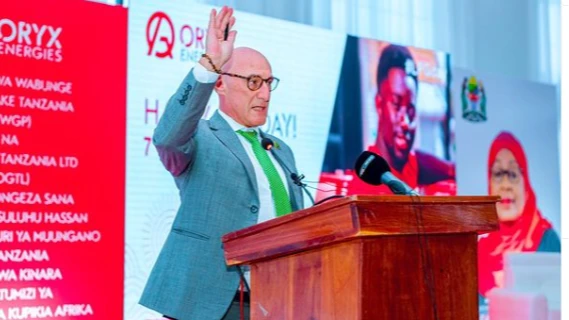‘Central bank maintains its lending rate to stabilize rising inflation’

IN July this year, the Monetary Policy Committee (MPC) of the Board of Directors of Central Bank of Tanzania (BoT) decided to keep the benchmark lending rate unchanged at six percent which was introduced in early April for the second quarter.
The same rate is commissioned to continue by the Board of Directors for the third quarter of the trading period that is applicable effectively from July to September 2024. The central bank aims at stabilizing the rising inflation in the country.
The bank rate is the rate of interest which is charged by a central bank while lending loans to a commercial bank. In the event of a fund deficiency, a bank can borrow money from the central bank of a country.
Decisions by MPC members are a move towards sustaining the country’s economic growth to boost consumer and business spending, thus helping to sustain the momentum of economic recovery.
Members of MPC of the central bank which held its quarterly meeting in early July this year, said in its final report that, ‘implementation of monetary policy in the previous two quarters has successfully anchored the inflation rate in the country’.
This was after evaluating an overall assessment of the economic outlook in the country and at a global level market and found that is entirely based on the macro-economic forecast.
The instigation of the move means that Tanzania’s economy is expected to continue growing strongly, food supply to be adequate and exchange rate pressures to moderate owing to increased foreign exchange inflows from tourism, gold, as well as cash crops and food.
According to the report by MPC members, domestic economic conditions have improved significantly in the recent past at the back of implementation of policies and reforms for fostering high economic growth.
The outlook also is positive, driven by expected favourable weather for agriculture, adequate power supply, improvement in infrastructure (especially railways, roads and ports), as well as policies and reform programs.
The report on summary of assessment of the recent performance of the economy and outlook which was signed by BoT Governor, Emmanuel Tutuba showed that, “the country’s economy continued to grow by 5.1 percent in 2023 compared to 4.7 percent in previous year 2022.
The main growth drivers were agriculture, mining, quarrying, construction, and financial intermediation (mainly credit to the private sector). Tourism, which cuts across many activities, also contributed to the strong growth.
Similarly, the Zanzibar economy expanded by 7.4 percent in 2023, compared to 6.8 percent in 2022, driven largely by tourism activities, food services, construction, and real estate. Economic growth is projected to be high in the second half of 2024 and the years ahead.
The country’s inflation remained below the target of 5 percent and consistent with the East Africa Community (EAC) and Southern African Development Community (SADC) convergence criteria. In April and May 2024, inflation was 3 percent and 3.1 percent, respectively.
Economic and monetary conditions contributed to strong private sector credit growth and stability of the financial sector. On annual basis, private sector credit growth averaged 16.4 percent during the second quarter of 2024, compared with 17.1 percent in the preceding quarter.
The banking sector remained liquid, profitable, and adequately capitalized; with deposits, assets, and loans increasing. Asset quality improved, as reflected by a lower NPL ratio of 4.4 percent in May 2024, below the tolerable level of 5 percent and 5.5 percent recorded in the corresponding period in 2023
Other factors considered by MPC members are that, in April and May 2024, inflation was at three percent and 3.1 percent, respectively largely as a result of low food inflation complemented by prudent monetary and fiscal policies.
Tanzania’s foreign exchange reserves remained adequate, above $ 5 billion at the end of June 2024, sufficient to cover more than 4 months of projected imports, while foreign currency liquidity improved slightly towards the end of June 2024, attributable to a gradual increase in foreign flows from tobacco, gold, and tourism.
The current account position continued to improve, as the global economy normalized from economic shocks. Exports improved on account of gold, tourism and traditional crops, meanwhile imports increased at a lesser extent than exports.
As a result, the current account deficit is estimated to have narrowed to $ 959.2 million in the quarter ending June 2024 compared with $ 977.8 million in the corresponding quarter in 2023.
“There is the anticipation of a further increase in foreign exchange inflows from tourism, mining, traditional exports, and export of food to neighbouring countries” said the report.
BoT joins Kenya, Uganda and Rwandan central banks that are cautiously loosening their monetary policy positions to strengthen consumer and business spending powers that have been significantly eroded by high cost of loans and high cost of goods and services which are adversely impacting economic growth rates in the region.
Available statistics from EAC partners states shows that, in January this year the Bank of Kenya raised its bank rates to 13 percent, Rwanda 7.5 percent, whereas in Uganda the rate stands at 10 percent.
According to the Bank of Burundi the benchmark interest rate has been fluctuating after it was last recorded at 12 percent. Interest rate averaged 9.22 percent from 2007 until 2023, reaching an all-time high of 16.24 percent in July of 2012 and a record low of 5.0 percent in December of 2022.
The National Bank of Rwanda (NBR) on May 2024 reduced its central bank rate by 50 percent and remained at 7.5 percent, attributing the policy shift to declining inflation and the slowing pace of exchange rate depreciation.
The Bank of Uganda’s MPC maintained its central bank rate at 10 percent up to June 2024, but now the domestic inflation has risen moderately lower than previously projected largely due to the exchange rate.
In Kenya, the MPC met on June 5, 2024 and decided to retain the policy rate at 13 percent, arguing its previous measures have lowered overall inflation to the mid-point of the target range, stabilised the exchange rate and anchored inflationary expectations.
Top Headlines
© 2024 IPPMEDIA.COM. ALL RIGHTS RESERVED

























